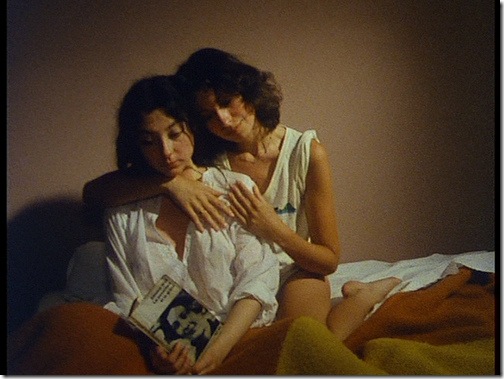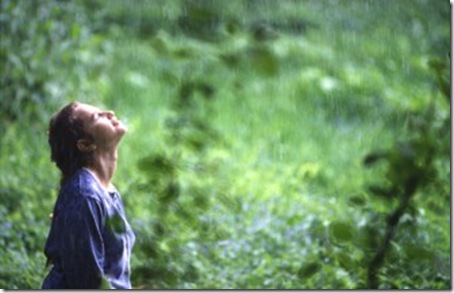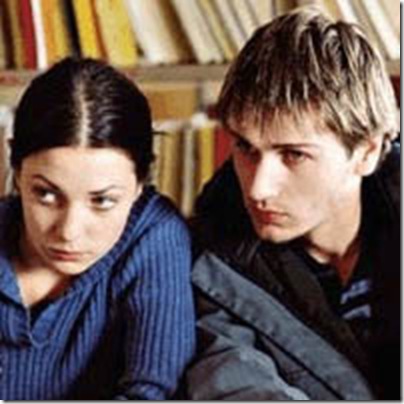I’ve never been to France, but when I visit, I’d prefer to avoid the parts of the country that seem to fascinate Jean-Claude Brisseau.
This underrated French director avoids the picturesque Paris of Woody Allen’s latest time-travel reverie, the tourist-chic France of living postcards, fashionable bistros and perpetually beautiful women. Nor is it the snooty enclave of the New Wavers’ on-location hipster paradise of pool halls, piano bars and art-house cinemas. Brisseau’s France, removed from the metropolises, is more like inner-city Detroit, a dangerous ground that only the brave, stupid or destitute dare tread.
I learned this while absorbing the three worthwhile films comprising Women on Margins: Cinema of Jean-Claude Brisseau, a newly compiled box set from Facets ($71.99). The earliest film in the series, the 1978 TV movie Life the Way It Is, offers the bleakest portrait of France’s underbelly. Violence and depravity are heightened and omnipresent.
A mentally ill person staggers through bus stations, warning passengers that he’s a “groper”; another head case wields a metal rod around a public space chanting, “You’re all corpses,” before his tirade is thwarted by a bullet from an unseen assassin. Deadly knife fights break out, over nothing, on the streets. Tenants of a dilapidated condominium plunge to their own deaths with regularity and are met by society with numbed indifference.
We see all of this happen, and most of it is simply background ambience, establishing a climate of cruelty for young protagonist Agnes Tessier (Maria Luisa Garcia) to overcome. She leaves her school and her home at the beginning of the film in order to finally generate some income, taking a secretarial position in a chemical factory that is, like every place else in the film’s cloistered universe, drab and oppressive.
Women are treated like the personal playthings of the company’s sexist male supervisors, and when Agnes speaks truth to power about the attempted rape of one of her colleagues, she is swiftly victimized by the so-called Golden Cupboard rule, which implies that if a company doesn’t have the rationale to fire an employee, it can simply break down her will to work until she quits.
If the movie really presents, as its title suggests, life the way it is (or was) in 1978 France, then it’s one of the most enraging films ever made, imbued with a hopeless, Fassbinder-like fatalism. Certainly, its documentary grit suggests more than a patina of authenticity — among the ahead-of-its-time innovations are a couple of early examples of direct-to-camera interviews with some of Agnes’ fellow employees, a practice that is now de riguer in the pseudo-documentary genre.
Brisseau draws much of the film’s emotional traction from the relationship between Agnes and her best friend Florence, a kinship that borders on the romantic. An overt depiction of a lesbian relationship in would have been awfully taboo in ’78, but Brisseau suggests carnal undercurrents, and the love between two women (one ostensibly straight) also manifests itself in 1992’s Céline, also included in this collection (Brisseau’s depiction of female same-sex relations reached its natural conclusion – explicit eroticism – in the ’00s, in the form of Secret Things and The Exterminating Angels).
Céline is about Genevieve (Maria Luisa Garcia again, billed here as Lisa Hérédia), a country nurse who happens upon a young woman crying in the rain. This turns out to be the title character (Isabelle Pasco), the troubled daughter of a newly deceased entrepreneur who fled her inheritance. It’s not long after she’s discovered that Céline tries to gorge on prescription pills and drown herself, so at the behest of Céline’s stepmother, Genevieve acts at Céline’s live-in doctor.
Here’s where the heretofore realistic story goes supernaturally haywire, a stylistic clash that defines much of Brisseau’s work. Through spiritual endeavors such as yoga and meditation, Céline reveals herself to be a healer; she can touch wounds and make them vanish, embrace paraplegics and enable them to walk again. And she can levitate.
Augmented by the sense of growth and loss in the two women’s relationship, Céline is a study of Eastern mysticism served straight, a fantastic twist in an earthbound world, and it suggests, through the tactile physicality of the world around Céline, the possibility of miracles. It’s not Brisseau’s strongest film, but it conjures up Robert Rossellini’s films about faith – secular movies dressed up in spiritual clothing.
Workers for the Good Lord, which had the better title God’s Little Footlings in France, is the odd film out in this series because its protagonist is a man, but it shares with Celine a vibrant mystical quality. It also has the unexpected violence of Life the Way It Is: Immature, illiterate Fred (Stanislas Merhar, a dead ringer for American comedian Christian Finnegan) quits his mechanic job by head-butting his boss, then wields an ax around his apartment complex when he reads a goodbye letter from his girlfriend.
He spends the rest of the picture robbing banks and redistributing wealth while on a quixotic quest to track down his ex – a trek that forces him to confront France’s subterranean crime syndicates. He is aided by Sandrine (Raphaële Godin), a longtime friend, and Maguette (Emile Abossolo M’bo), a shaman who claims to be the heir of a deposed African king.
The story grows increasingly surreal and violent, with Brisseau’s stylized carnage recalling the dazzling set-pieces in Goodfellas and City of God. At the same time, the director’s evocation of nature is his most painterly and luminescent. Workers for the Good Lord doesn’t have the social impact of Brisseau’s early work, but it’s his most exciting stab at conventional genre filmmaking. It also benefits from having the best-looking transfer in this box set.
Be forewarned about the other two – the transfers are not DVD-quality. Nonetheless, this is a great introduction to a controversial and always surprising auteur.


